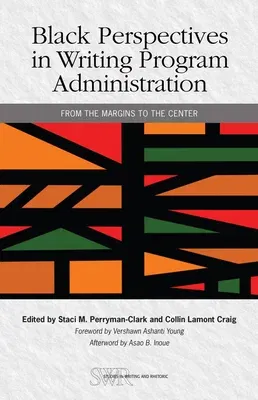This volume then on fleek cuz it straight presentin what ahm calling
this blended wokeness-protest and humanity, racialized pedagogical
experiences, . . . and the possibilities for racial empathy.
- Vershawn Ashanti Young, University of Waterloo, from the
Introduction
Black Perspectives in Writing Program Administration is a powerful and
moving argument for genuinely recognizing how black bodies are
racialized-rendered invisible, disrespected, and marginalized in their
labor-in postsecondary writing programs. What's more, Perryman-Clark and
Craig, with their contributing authors, critically explore and reflect
on what it means to practice WPA curricular, assessment, and other
educational work informed by an Afrocentric perspective.
A theoretical as well as a pragmatic work, this book is essential
reading for those who wish to challenge the racial underpinnings of
writing program administration.
- Haivan V. Hoang, University of Massachusetts-Amherst
This collection centers writing program administration (WPA) discourse
as intersectional race work. In this historical moment in public
discourse when race and racist logics are no longer sanitized in coded
language or veiled political rhetoric, contributors provide examples of
how WPA scholars can push back against the ways in which larger,
cultural rhetorical projects inform our institutional practices, are
coded into administrative agendas, and are reflected in programmatic
objectives and interpersonal relations. Editors Staci M. Perryman-Clark
and Collin Lamont Craig have made a space for WPAs of color to cultivate
antiracist responses within an Afrocentric
framework and to enact socially responsible approaches to program
building. This framework also positions WPAs of color to build
relationships with allies and create contexts for students and faculty
to imagine rhetorics that speak truth to oppressive and divisive
ideologies within and beyond the academy, but especially within writing
programs. Contributors share not just experiences of racist
microaggressions, but also the successes of black WPAs and WPAs whose
work represents a strong commitment to students of color. Together they
work to foster stronger alliance building among white allies in the
discipline, and, most importantly, to develop concrete,
specific models for taking action to confront and resist racist
microaggressions. As a whole, this collection works to shift the focus
from race more broadly toward perspectives on blackness in writing
program administration.

